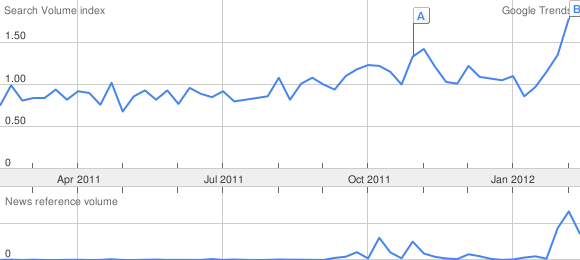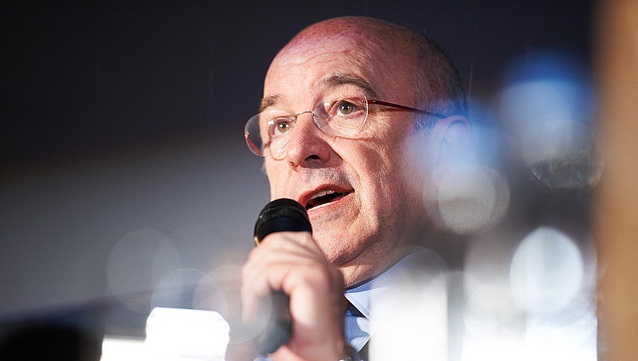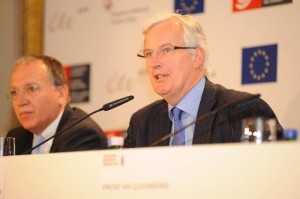As reported here and elsewhere [1, 2, 3], the European Council agreed on the EU Unitary Patent and a EU Unified Patent Court at last week’s Brussels EU summit after volatile negotiations – by ‘suggesting’ two significant amendments (see summit conclusion, page 2, item 3) as compared to what was know from the latest available draft text of the Unitary Patent Regulation dated 23 June 2011 (see here and here).
EU Court of Justice: The more severe one of those amendments that apparently was pushed through by UK Prime Minister David Cameron to please his eurosceptics allies at home, demands
that Articles 6 to 8 of the [Unitary Patent] Regulation [...] to be adopted by the Council and the European Parliament be deleted
essentially meaning that substantive EU patent law will not any more be subject to legal order of the Union highest court, the European Court of Justice (CJEU). I share my colleague’s view that this is nothing less than “an open declaration of deep mistrust, if not political warfare of significant parts of the UK conservatives against the CJEU and thus the European Union as a whole.
This move, however, could not escape the eyes of the European Parliament, which originally wanted to nod through this matter tomorrow (4 July 2012) whereas meanwhile the item was removed from the agenda under the harsh critics of rapporteurs Bernard Rapkay (S&D, DE) and Klaus-Heiner Lehne (EPP, DE): “scandalous breach of procedure“, “oriental bazaar” (did they read this item?), ”case would go straight to the European Court of Justice“. Due to the Council’s amendments, the first reading is thus rendered null and void.
It appears that the proudness of the Danish Presidency as well as the official cries of joy of e.g. EPO President Benoît Battistelli (“historic breakthrough“) and EU Commissioner Michel Barnier (“decisive step“) came far too early while stakeholders ask themselves if this mess could not have been prevented by a more transparent process, more cooperation with the potential system users, less political tactics, and less national egoisms and horse trading. It is depressive to say, but if the implementation of a reasonable EU patent system was the litmus test for Europe’s capacity for efficient policy-making, the conclusion can only be that the striking deficiencies of the EU’s political management appear to be insurmountable.

- Occurrence of the term “FRAND” in Google searches during the previous 12 months. In November 2011 (A) the EU Commission started investigations against Samsung due to possible infringement of FRAND conditions. In February 2012 (B) Google announced that the acquired Mororola patents will remain to be licensable under FRAND conditions.
In Part 1 of our series of two postings on political and business issues in the discussion on FRAND licensing in Europe, we sketched the EU Commission’s political approach towards maintaining free markets in times of standard-essential patents.
Now, in Part 2, we will have a closed look at what the various industry players in the ‘smartphone war’ say and do.
The ‘Smartphone War’: The significance of Mr Almunia’s agenda can be easily derived for the global patent conflict that initially started between Apple and Samsung and meanwhile, after months of infringement suits and injunctions, involves also essentially all other important Internet and mobile telco players such as Google, Motorola, Microsoft, Nokia and HTC. In an earlier posting we considered this to be a sort of stress test for the patent system as it currently is.
This is the first in a series of two postings – the second part will be published later today -, that relate to both the political and business attitude towards FRAND licensing in Europe. As there are two main players in that game, namely the EU Commission as the political market watch-dog and the Smartphone industry as patent holders and actors on these markets, we will first have a look at the political agenda of the EU Commission towards ensuring free market access in a world of standard-essential patents, as articulated in clear words only recently. In the light of the Commissions approach, the hint at the “Commission’s position as regulator-in-chief of the global technology industry”, as seen by the Financial Times back in 2007 , might never have been more true than today.
Yesterday the EPO News channel reported on a “renewed commitment to cost-efficient European patents” by the EPO and the European Commission. As nobody really had the slightest doubts on the continued and strong support by the project’s two main driving forces, this “news” does not sound that confident and persuasive as it apparenty was intended.
I cannot help, but to me it sounds more like political PR language or even autosuggestion if the President of the EPO, Benoît Battistelli, and the European Commissioner for the Internal Market and Services, Michel Barnier, jointly confess that “the unitary patent is [...] expected to simplify procedures and lower the costs for applicants by up to 70%“.
The k/s/n/h::law blog
Some of the patent attorneys of the KSNH law firm have joined their efforts to research what is going on in the various branches of IP law and practice in order to keep themselves, their clients as well as interested circles of the public up to date. This blog is intended to present results of such efforts to a wider public.
Blog Archives
- November 2013 (2)
- October 2013 (1)
- September 2013 (1)
- August 2013 (2)
- July 2013 (3)
- June 2013 (5)
- March 2013 (5)
- February 2013 (4)
- January 2013 (5)
- December 2012 (5)
- November 2012 (5)
- July 2012 (5)
- June 2012 (8)
- May 2012 (5)
- April 2012 (3)
- March 2012 (4)
- February 2012 (5)
- January 2012 (6)
- December 2011 (12)
- November 2011 (9)
- October 2011 (9)
- September 2011 (4)
- August 2011 (7)
- July 2011 (4)
- June 2011 (1)
Blog Categories
- business methods (6)
- EPC (7)
- EPO (12)
- EU law (92)
- ACTA (8)
- CJEU (4)
- Comitology (1)
- competition law (2)
- Enforcement (6)
- EU Unified Patent Court (62)
- FTA India (1)
- TFEU (2)
- Trade Marks (5)
- European Patent Law (37)
- German Patent ACt (PatG) (1)
- German patent law (5)
- Germany (6)
- Pirate Party (3)
- International Patent Law (4)
- PCT (2)
- IP politics (10)
- licenses (2)
- Litigation (5)
- Patentability (7)
- Patents (12)
- Piratenpartei (2)
- Software inventions (10)
- Uncategorized (9)
- Unitary Patent (24)
- US Patent Law (4)
Comments
- kelle on Germany: Copyright Protection More Easily Available For Works Of “Applied Arts”
- Time Limits & Deadlines in Draft UPCA RoP: Counting The Days - KSNH Law - Intangible.Me on Wiki Edition of Agreement on Unified Patent Court Agreement (UPCA)
- Time Limits & Deadlines in Draft UPCA RoP: Counting The Days | ksnh::law on Wiki Edition of Agreement on Unified Patent Court Agreement (UPCA)
- Wiki Edition of Agreement on Unified Patent Cou... on Wiki Edition of Agreement on Unified Patent Court Agreement (UPCA)
- European Commission Takes Next Step Towards Legalising Software Patents in Europe | Techrights on EU Commission publishes Proposal of amendend Brussels I Regulation for ensuring Enforcement of UPC Judgements
Blogroll
- 12:01 Tuesday
- America-Israel Patent Law
- Anticipate This!
- AwakenIP
- BlawgIT
- BLOG@IPJUR.COM
- BP/G Radio Intellectual Property Podcast
- Broken Symmetry
- Class 46
- Director's Forum: David Kappos' Public Blog
- Gray on Claims
- I/P UPDATES
- IAM Magazine Blog
- Intellectual Property Intelligence Blog
- IP Asset Maximizer Blog
- IP CloseUp
- IP Dragon
- IP Watch
- IP Watchdog
- IPBIZ
- ipeg
- IPKat
- ITC 337 Law Blog
- Just a Patent Examiner
- K's Law
- MISSION INTANGIBLE
- Patent Baristas
- Patent Circle
- Patent Docs
- Patently Rubbish
- PatentlyO
- Patents Post-Grant
- Reexamination Alert
- SPICY IP
- Tangible IP
- The 271 Patent Blog
- The Intangible Economy
- THE INVENT BLOG®
- Think IP Strategy
- Tufty the Cat
- Visae Patentes
The KSNH blogging landscape


This blog and the German-language sister blog k/s/n/h::jur link to the two popular and privately run blogs IPJur und VisaePatentes and continue their work and mission with a widened scope and under the aegis of our IP law firm.
ksnhlaw on Twitter
- No public Twitter messages.
 KSNH::JUR Feed (german)
KSNH::JUR Feed (german)- Ist Verschlüsselung passé? September 6, 2013Auf verschiedenen Feldern beruflicher Praxis ist dafür zu sorgen, dass Kommunikation vertraulich bleibt. Die trifft beispielsweise für Ärzte zu, aber auch für Anwälte, darunter auch Patentanwälte. Einer der zahlreichen Aspekte, die in diesem Zusammenhang eine Rolle spielen, ist die Technik, um die Vertraulichkeit beruflicher Kommunikation sicherzustellen. Wa […]
- EU-Einheitspatent: Demonstrativer Optimismus und Zahlenmystik allerorten – Naivität oder politische Beeinflussung? June 26, 2013Nach mehreren vergeblichen Anläufen zur Schaffung eines EU-weiten Patentsystems wurde 1973 als Kompromiss das Europäische Patentübereinkommen unterzeichnet, welches unabhängig von der seinerzeit noch EWG genannten Europäischen Union System zur zentralisierten Patenterteilung mit nachgeordnetem Einspruchsverfahren durch das Europäische Patentamt schuf. Wie wi […]
- Moderne Zeiten oder: DPMA und Patentgericht streiten über die elektronische Akte April 25, 2013Bekanntlich hat das Deutsche Patent- und Markenamt (DPMA) im Jahre 2013 mit der rein technischen Fertigstellung der Einrichtungen zur elektronischen Akteneinsicht einen wichtigen Meilenstein seines Überganges von der Papierakte zur “elektronischen Akte” erreicht. Im DPMA werden aber bereits seit dem 01. Juni 2011 Patente, Gebrauchsmuster, Topografien und erg […]
- Gutachten zu Forschung, Innovation und technologischer Leistungsfähigkeit Deutschlands 2013 March 11, 2013Unter dem Datum vom 28. Februar 2013 ist die Bundestags-Drucksache 17/12611 veröffentlicht worden Sie trägt den Titel Unterrichtung durch die Bundesregierung - Gutachten zu Forschung, Innovation und technologischer Leistungsfähigkeit Deutschlands 2013. Die Bundesregierung legt dem Deutschen Bundestag seit dem Jahr 2008 […]
- 3D-Printing: Zum Filesharing von 3D-Modelldaten February 25, 2013In meiner kleinen zuvor angekündigten Reihe über rechtliche Aspekte des 3D Printing komme ich heute auf die Frage zu sprechen, ob die Hersteller von Gerätschaften es hinnehmen müssen, wenn Ersatztreile davon – vom Brillengestell über Smartphone-Gehäuseteile bis hin zu Rastenmähermotor-Abdeckungen – gescannt und die daraus […]
- Ist Verschlüsselung passé? September 6, 2013







